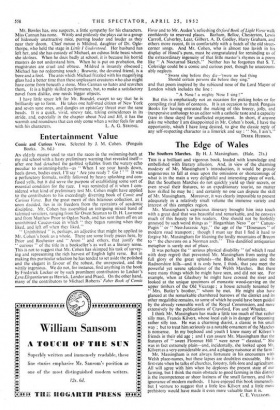The Edge of Wales
The Southern Marches. By H. J. Massingham. (Hale. 21s.) Tills is a brilliant and vigorous book, loaded with knowledge and embellished with literary allusion. And, in view of the charming modesty of Mr. Massingham's introduction, it would be grossly ungenerous to fall at once upon the omissions or shortcomings of what is in the main a very delightful and interesting piece of work. But the Southern Marches do not quickly yield up their secrets, or even reveal their features, to an expeditionary tourist, no matter how skilled he may be ; and certainly no one can dispute the skill of Mr. Massingham. Moreover, it was clearly impossible to present adequately in a relatively small volume the immense variety and interest of this complex region.
Mr. Massingham's capricious itinerary brought him into touch with a great deal that was beautiful and remarkable, and he conveys much of this beauty to his readers. One should not be foolishly annoyed by such weird things as " Hogarthian Nero " or " Canute- Pugin " or " Neo-Jurassic Age," the age of the "Dinosaurs " of modern road transport ; though I must say that I find it hard to forgive Mr. Massingham for likening the lordly mountains of Brecon to " the chevrons on a Norman arch." This dandified antiquarian metaphor is surely out of place.
It was perhaps the " serious physical disability " (of which I read with deep regret) that prevented Mr. Massingham from seeing the full glory of the great uplands—the Black Mountains and the Radnorshire hills—and it is only here, I think, that you meet the powerful yet serene splendour of the Welsh Marches. But there were many things which he might have seen, and did not see. For example, when at Glasbury he might have crossed the river and looked at the unique specimens of monastic wood-carving on the upper timbers of the Old Vicarage ; a house actually tenanted by " Mrs. Butler's brother," whom he met. He might also have glanced at the remarkable chambered barrows of the district and its other megalithic remains, to some of which he could have been guided by the already venerable work of the Royal Commission, and more extensively by the publications of Crawford, Fox and Wheeler.
I think Mr. Massingham has made a little too much of that rather silly man, Francis Kilvert, whose local cult is in danger of becoming rather silly too. He was a charming diarist, a classic in his small way ; but to treat him seriously as a notable ornament of the Marches is nonsense. In my boyhood and youth I knew many of Kilvert's friends in their old age ; and I can assure Mr. Massingham that the features of " sweet Florence Hill " were never " classical." She was in fact extremely plain—and, incidentally, she looked upon Mr. Kilvert as a very considerable ass, and a plaguey nuisance at the farm !
Mr. Massingham is not always fortunate in his encounters with Welsh place-names, but these lapses are doubtless excusable. He is first-rate when he talks of churches, forestry, folk-lore and agriculture. All will agree with" him when he deplores the present state of our farming, but I think the main obstacle to good farming in this district is the incompetence or sheer laziness of the small farmers, and their ignorance of modern methods. I have enjoyed this book immensely, but I venture to suggest- that a little less Kilvert and a little more prehistory would have made it even more valuable than it is.
C. E. VULLIAMY.


































 Previous page
Previous page